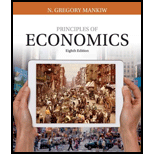
The difference between the Stock and the Bond.
Answer to Problem 1CQQ
Option 'd' is correct.
Explanation of Solution
Both the Stocks and the Bonds are the financial market instruments used by the people in the economy. Amongst them, the share provides the ownership right to those who holds them whereas the Bond is an income investment which is fixed and thus it acts as a certificate of indebtedness. There are many matches between the Stocks and the Bonds. Both of them are financial instruments, used to raise capital to the firm, traded on exchange and both entail risks.
Option (d):
The stock makes the holder of the stock to be a shareholder of the firm which issues the stock. This means the stock holder holds the ownership share of the firm and thus, the stock provides the share of the firm's profit to the stock holder. The Bond on the other hand is a certificate of indebtedness which guarantees the repayment of the loan amount when the bond matures and it provides interest to the loan issuer by the taking firms. Here, individual J offered one-third of the profit of the firm which means Jerry is a stock holder whereas the individual George who receives interest for the amount provided is a bond holder. Thus, option 'd' is correct.
Option (a):
The stock makes the holder of the stock to be a shareholder of the firm and it provides the share of the firm's profit to its holder whereas the Bond is a certificate of indebtedness which guarantees the repayment of the loan amount after the maturity period of the bond. Here, Elaine is the issuer of Bond and stock to George and Jerry because he takes the money from both of them to create capital and start the business. Here, George receives interest and jerry receives share of profit. So George is the Bond holder and Jerry is the stockholder. Since, Elaine is not amongst the two groups, option 'a' is incorrect.
Option (b):
The stock makes the holder of the stock to be a shareholder of the firm and it provides the share of the firm's profit to its holder whereas the Bond is a certificate of indebtedness which guarantees the repayment of the loan amount after the maturity period of the bond.
Here, George receives interest which is received on the Bonds and Jerry receives share of profit which is by the stock. Thus, they are Bond holders and stock holders respectively. Since the option explains them inversely, option 'b' is incorrect.
Option (c):
The stock provides share of profit to the holder of the stock and thus, Jerry who receives the profit share of the firm is a stockholder. But Elaine is the individual who issues the Bonds and stocks in order to raise the capital need for the firm and thus he is neither a bondholder nor a stockholder. Since option explains Elaine as a Bondholder, option 'c' is incorrect.
Concept introduction:
Stock: A stock means a partial ownership of the firm. The stocks are the shares are sold to the people in order to raise the capital for the firm. Thus, those who owns stocks owns the share of the ownership of the firm.
Bond: It is the certificate of indebtedness of the bond issuer to the holder. So, it is a fixed income investment in which an investor loans capital to an entity for a period of time at variable interest rates.
Want to see more full solutions like this?
Chapter 26 Solutions
Principles of Economics (MindTap Course List)
- Based on current information on the U.S. stock market and the debt markets, including interest rates: (a) would you recommend that a firm raise funds through borrowing or by issuing stock? (b) would you recommend that a household build wealth by investing in the stock market or in real estate? Explain your answers to a. and b. Hint: You may begin with general information about current developments in the equity and debt markets, and the discuss how firms and households may use this information to make short-term and long-term financial decisions.arrow_forwardFor each of the following pairs, which bond would you expect to pay a higher interest rate? Explain! a bond of the U.S. government or a bond of an East European government a bond that repays the principal in year 2015 or a bond that repays the principal in year 2040 a bond from Coca-Cola or a bond from a software company you run in your garage a bond issued by the federal government or a bond issued by New York State 2. Many workers hold large amounts of stock issued by the firms at which they work. Why do you suppose companies encourage this behavior? Why might a person not want to hold stock in the company where he works? 3. Economists in Funlandia, a closed economy, have collected the following information about the economy for a particular year: Y = 10,000; C = 6,000; T = 1,500; G = 1,700. The economists also estimate that the investment function is: I =3,300 –100r where r is the country’s real interest rate, expressed as a percentage. Calculate private saving, public saving,…arrow_forward
 Essentials of Economics (MindTap Course List)EconomicsISBN:9781337091992Author:N. Gregory MankiwPublisher:Cengage Learning
Essentials of Economics (MindTap Course List)EconomicsISBN:9781337091992Author:N. Gregory MankiwPublisher:Cengage Learning Principles of Economics (MindTap Course List)EconomicsISBN:9781305585126Author:N. Gregory MankiwPublisher:Cengage Learning
Principles of Economics (MindTap Course List)EconomicsISBN:9781305585126Author:N. Gregory MankiwPublisher:Cengage Learning Brief Principles of Macroeconomics (MindTap Cours...EconomicsISBN:9781337091985Author:N. Gregory MankiwPublisher:Cengage Learning
Brief Principles of Macroeconomics (MindTap Cours...EconomicsISBN:9781337091985Author:N. Gregory MankiwPublisher:Cengage Learning Principles of Macroeconomics (MindTap Course List)EconomicsISBN:9781305971509Author:N. Gregory MankiwPublisher:Cengage Learning
Principles of Macroeconomics (MindTap Course List)EconomicsISBN:9781305971509Author:N. Gregory MankiwPublisher:Cengage Learning Principles of Economics, 7th Edition (MindTap Cou...EconomicsISBN:9781285165875Author:N. Gregory MankiwPublisher:Cengage Learning
Principles of Economics, 7th Edition (MindTap Cou...EconomicsISBN:9781285165875Author:N. Gregory MankiwPublisher:Cengage Learning Principles of Macroeconomics (MindTap Course List)EconomicsISBN:9781285165912Author:N. Gregory MankiwPublisher:Cengage Learning
Principles of Macroeconomics (MindTap Course List)EconomicsISBN:9781285165912Author:N. Gregory MankiwPublisher:Cengage Learning





